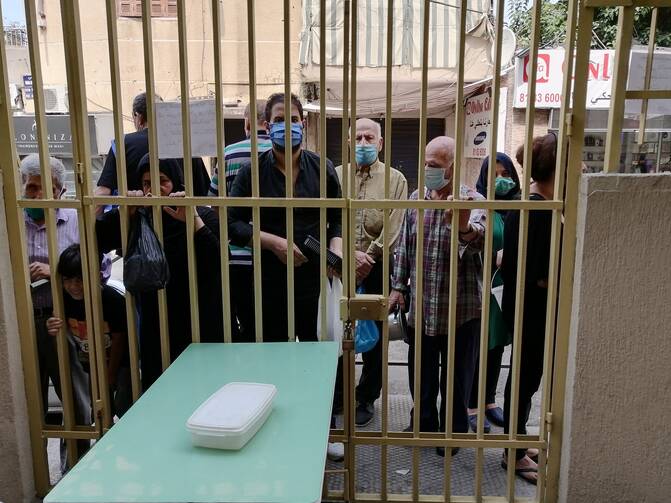BEIRUT (CNS) — Sister Marie Justine el Osta had just begun a spiritual retreat in a mountain convent 27 miles north of Beirut. Even in that remote location, the blast that rocked Lebanon’s capital Aug. 4 could be felt, like an earthquake.
Sister el Osta immediately drove to the Socio-Medical Intercommunity Dispensary, where she serves as director, in the poor neighborhood of Naba, 2.5 miles from the Beirut port.
“I was in shock. I was speechless. I cried,” she said, her eyes welling with tears as she recalled her first encounter with the devastation at the center. Closing her eyes, her hands clasped in prayer for a moment, Sister el Osta composed herself, saying, “It really broke my heart, but I had to be strong.”
She said she is thankful that the center already had closed for the day and there was no one on site at the time of the double explosion, shortly after 6 p.m.
“Seeing all the destruction, my first thought was, ‘How will we ever fix this? How will we endure this?'” Sister el Osta recounted to Catholic News Service.
Her photos reveal doors ripped from frames, blown-out windows, collapsed ceilings, cabinets and furniture scattered helter-skelter, and the floor — a sea of glass topped with a tangle of debris.
Working through the night, Sister el Osta, staff and volunteers cleared as best they could to prepare for the next day.
“We had to open. People would be waiting for food,” said the nun, a member of the Maronite Order of the Holy Family. Despite the damage, such outreach was still possible, as meals are prepared off-site and, due to coronavirus precautionary measures, are distributed outdoors at the entrance to the building.
As Lebanon’s economy worsened, the dispensary had expanded its medical and social mission to include distribution of hot meals to those in need, at first around 250 portions a day in 2017. That number has increased to 1,200 per day, as Lebanon tips on the brink of economic collapse, plunging even the middle class into poverty.
An August report by the U.N. Economic and Social Commission for Western Asia warned that more than 55% of Lebanon’s population is now trapped in poverty and struggling to meet basic needs for bare necessities. This figure is almost double the rate for the previous year, which stood at 28%. Statistics on extreme poverty have tripled between 2019 and 2020, from 8% to 23%.
In less than a year, the Lebanese currency has lost more than 80% of its value. The country is now in the state of hyperinflation. According to data released by the Central Administration of Statistics, consumer goods prices — including food and nonalcoholic beverages — increased by more than 336% from July 2019 to July 2020.
One recent day, beneficiaries lined up outside the center, patiently waiting in the sweltering heat. Most carried plastic containers they had brought from home, where they would eat the meal provided by the center. Because of COVID-19 measures, the iron entry gates were closed, allowing access for just a few people at a time.
Jocelyn Fayed, 51, came to the center with one of her 16-year-old triplets, Joe.
Although her home outside of Beirut suffered little damage, she started to come to the center for meals soon after the blast. Lately, she said, there is hardly any food in her family’s refrigerator — just bread and labneh — a Lebanese staple, which is a cream cheese-like spread, made from strained yogurt.
Fayed admitted that she finds it difficult to be on the receiving end with the needy. “But I have my family to feed,” she said. “We are so thankful to be helped.”
Determined to provide for her family, Fayed began driving her husband’s taxi several years ago, after his diabetes triggered near blindness and kidney disease. In a country where taxi driving is rare among females, Fayed noted that “people encourage me.”
But with the economic crisis, the pandemic and the aftermath of the blast, she said she finds her time spent on the road is more in search of customers, rather than in transporting them.
Souad Madeh, 63, used to accompany her elderly mother to the dispensary for her medical appointments for chronic heart disease. Her mother died earlier this year.
“I never imagined that I would be coming back here for food for my family,” Madeh told CNS.
“It is a hard decision to have to ask for food. But, we are all becoming poor. We are all the same now. Poor,” said the soft-spoken woman.
“The sisters are doing a great job of keeping the community alive,” she added.
The Socio-Medical Intercommunity Dispensary was originally founded in 1968 by the Franciscan Missionary Sisters of Mary to serve those in need; it has been run by the Assembly of Female Religious Congregations since 1973. Its services include general medicine, cardiology, gynecology and obstetrics, pediatric medicine, nephrology and dental, as well as diagnostics and providing vaccinations. It is supported by the Catholic Near East Welfare Association.
The center sustained $38,000 in damage from the blast. The medical clinic resumed its services Sept. 7.
Sister el Osta said that, before the port blasts, she had hoped to update the dispensary.
“Now, after the blast, we are going years backward. Not only our center and dispensary. The whole country,” she said.
“We need a miracle,” she said of Lebanon’s dire situation.










